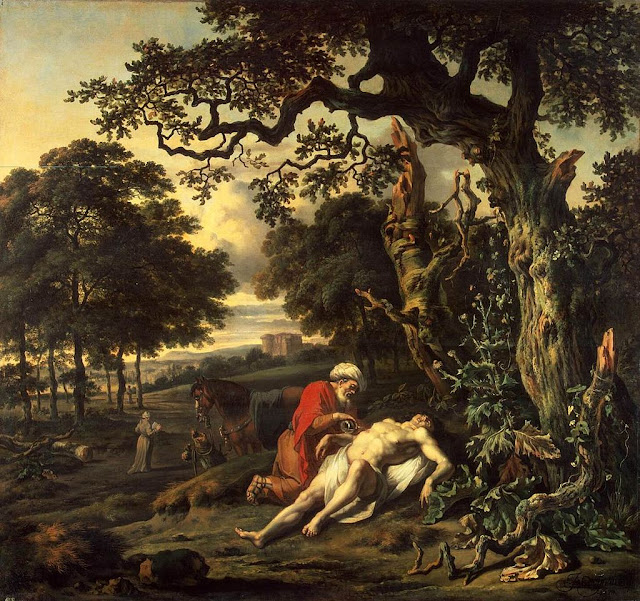The Good Samaritan: an ancient tradition of interpretation
This line of tradition is such that a scholar like Jean Danielou could suggest that it goes back to the first Christian community. If that is the case, it is probable that it goes back to Our Lord himself, in the “many other things” that Our Lord said. (Jn 21.25) This is why the Fathers of the Church are so important; they preserve for us the apostolic tradition, the lessons which the apostles themselves learned from Christ but are not written down.
St Basil, for example, speaks of this tradition in a passage that has become widely cited because of its liturgical significance, but is important apart from any such considerations.
“Of the beliefs and practices whether generally accepted or publicly enjoined which are preserved in the Church some we possess derived from written teaching; others we have received delivered to us in a mystery by the tradition of the apostles; and both of these in relation to true religion have the same force.” (St Basil. On the Holy Spirit. 27)One of these traditions is facing the East to pray; others are the threefold action at baptism, blessing the water at baptism and blessing the chrism.
By way of example of the explanation of the parable, St Irenaeus, writing around 180AD says that the Lord showed compassion on the man (all of us) who had been attacked by robbers, bound up his wounds, gave him two denarii which were the image of the Father and the Son, and commended him to the Holy Spirit, represented by the innkeeper.
St Irenaeus treats this interpretation as self-evident, from which we can presume that it is already traditional by the mid second century.
Clement of Alexandria, writing probably about 20 years later, also sees the Samaritan as Christ, who heals us of our wounds:
"Who else can it be but the Saviour Himself? Or who more than He has pitied us, who by the rulers of darkness were all but put to death with many wounds, fears, lusts, passions, pains, deceits, pleasures? Of these wounds the only physician is Jesus, who cuts out the passions thoroughly by the root - not as the law does the bare effects, the fruits of evil plants, but He applies His axe to the roots of wickedness."(St Clement of Alexandria. Quis dives salvetur. 29)
St Ambrose (correcting Origen who also commented on the parable) sees the man as Adam who comes down because of sin; he is only attacked because of being in that condition.
St Augustine then takes up the theme from St Ambrose. He adds the interpretation of the oil and wine as the sacrament of Baptism which remits all our sins, but he says that our weakness remains. This is against the Pelagians who deny the effects of original sin and the weakness which remains after Baptism. So the wounded man, each of us, needs to be looked after in the inn, which signifies the Church.
St Augustine warns that we should not rejoice as though we are already cured of all our infirmities by Baptism. We need to stay all our lives in the inn, the Church, so that we may be completely completely cared for, and be ready to leave the inn only to enter the Kingdom of Heaven. (St Augustine. Sermo 131.6 ML 38.732)
For ourselves, then, the parable of the good Samaritan is not limited to the duty of being kind to the unfortunate and not bearing prejudice against those who are of a different group from us. It does teach these lessons and we ought to observe them, but we should also learn that the parable applies to us personally in our spiritual lives.
We are fallen and wounded by sin. Without Our Lord and the grace of the sacraments, we are left dying by the roadside. Our Lord not only binds up our wounds by the sacraments, he also makes us members of the Church, in which those wounds are not only no longer fatal, but they are also healed by the regular nourishment that we receive through the grace of the sacraments and all the other graces that we receive through the Church.
Following on from the theme of yesterday’s feast of the Immaculate Heart of Mary, we are also in the home of Our Lady when we are brought to the inn. As our Co-Redemptrix, she shares in the work both of rescuing us, and of fostering our lifelong convalescence. Her prayers continue to bring strength to the soul, just as we might suppose the food of the innkeeper’s wife brought strength to the body of the man who was robbed. Our devotion to, and praise of our Blessed Mother bring joy to the heart of Our Lord who is the good Samaritan for each of us.
